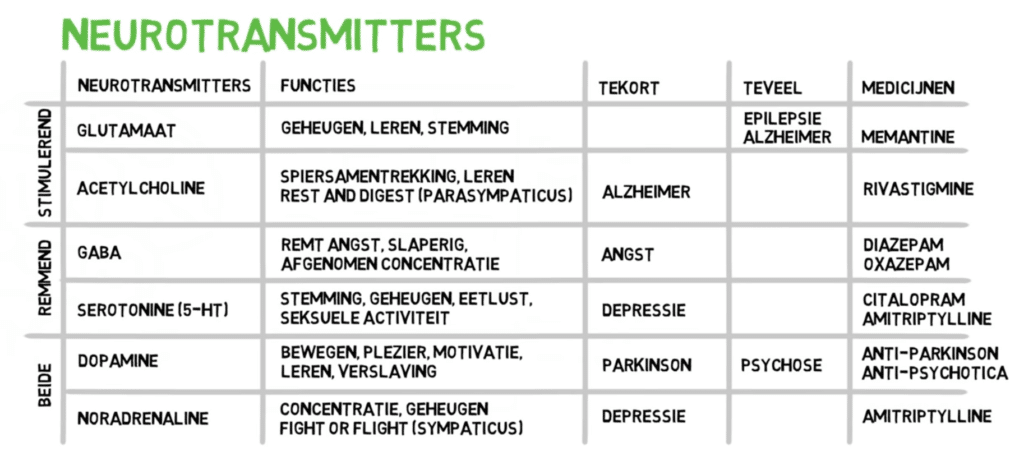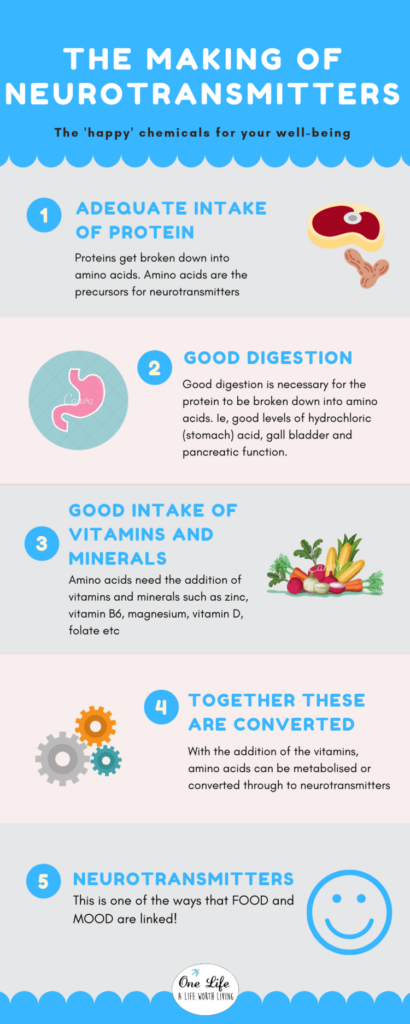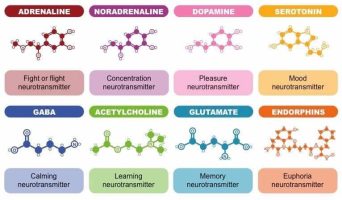Neurotransmitters
The neurotransmitters are the chemical messengers of the brain. The neurotransmitters determine the paths of stimulus conduction via the neurons and thus how we think and what our mood is. Is there a deficiency of certain neurotransmitters? Then communication in the brain takes place differently and (psychological) problems can arise.

Neurotransmitters through food and supplements
The building blocks of various neurotransmitters can be obtained from food. When processing food, we are primarily dependent on our intestinal flora. Without the right bacteria and fungi, we simply cannot convert food in the right proportions into substances that we can use. The first step is to ensure that the right bacteria are present in the intestines. This is especially important after antibiotic treatments and food poisoning.

Step 1
Buy the right probiotics. When purchasing probiotics, it is advisable to purchase one that contains the most important bacterial strains involved in pre-digesting our food. The best one I found is this:
Ultra Jarrow Dophillus and can be purchased at, among others
Bodystore | Smeets and graze
Step 2
Ensure that neurotransmitters enter the brain cells more easily and connect more easily with the receptors by consuming the right omega 3. We are talking about DHA and EPA. The best sources are fresh oily fish or supplements such as krill, fish or algae oil. Krill oil works a little better than fish oil and algae oil is vegetarian/vegan.
Step 3
Provide sufficient vitamin B (1,2,3,6 and 12), vitamin C, vitamin D (sunlight), magnesium, potassium, calcium, copper and iron through food or supplements. These additives ensure the correct conversion of food into neurotransmitters. With a varied diet you can get all these additives. Supplementing with a good multivitamin is possible, but is not always necessary.
Stap 4
In general, most neurotransmitters are made from amino acids. Amino acids are the building blocks of proteins. Temporary protein-rich food can therefore help to prevent neurotransmitter deficiency.
Eat the following foods more often as basic raw materials for the neurotransmitters. Take into account any allergens and ensure that animal food is animal-friendly and healthy.
| Power supply | Dopa | Nora | GABA | Sero | Acet | Taur | Glut |
|---|---|---|---|---|---|---|---|
| Potatoes | ✔ | ||||||
| asparagus | ✔ | ||||||
| Avocado | ✔ | ✔ | |||||
| Bananas | ✔ | ✔ | |||||
| Leafy vegetables | ✔ | ||||||
| Broccoli | ✔ | ✔ | |||||
| Brown rice | ✔ | ||||||
| Poultry | ✔ | ✔ | |||||
| Cheese | ✔ | ✔ | |||||
| Cabbage | ✔ | ||||||
| Nuts | ✔ | ✔ | ✔ | ✔ | |||
| Legumes | ✔ | ✔ | |||||
| Kernels | ✔ | ||||||
| Free-range eggs | ✔ | ✔ | ✔ | ||||
| Shellfish | ✔ | ||||||
| Soybeans | ✔ | ||||||
| Onions | ✔ | ||||||
| Meat | ✔ | ✔ | ✔ | ✔ | |||
| Whole grain | ✔ | ||||||
| Fish | ✔ | ✔ | ✔ | ||||
| Seeds | ✔ | ✔ | |||||
| Dairy | ✔ | ✔ | ✔ |
Neurotramitter test
We have our clients who opt for trip therapy complete an intake and neurotransmitter test. The questions give us an indication of whether there is a deficiency of certain neurotransmitters. Even before the psychedelic session, we will get the neurotransmitters more balanced through nutrition and supplement advice so that the psychedelic session has an even greater effect.
Read more about nutrition and health
The relationship between food and how we feel is stronger than what many people think. The more we learn about health, the better we can act against depression, anxiety and other psychological or physical complaints. Also read our other blog posts about nutrition and (mental) health.
Amino acids against anxiety and depression
Fats against chronic inflammation
More testosterone, more masculinity, more muscles and less stress
ORAC values nutrition and free radicals
The relationship between BDNF, depression, nutrition, exercise and magic mushrooms
Pomegranate for athletes and for optimal health
Supplements that give everyone a positive boost
Slightly less depressed, angry, tired and anxious with saffron (and 12 more benefits)







